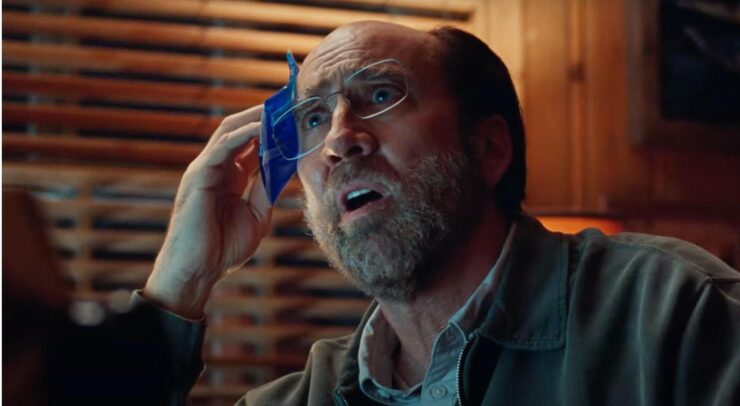WHEN DREAMS MEET REALITY, WHAT CAN GO WRONG?
Directed by Ari Aster, Dream Scenario has its place in the filmmaker’s dark and unsettling filmography. This movie isn’t exactly horror — it’s more so part character study, part social critique, leaving you unsure of what to think or who to root for.
Paul Matthews, played by Nicolas Cage, is a middle-aged and unmemorable evolutionary biology professor. Since he is unsuccessful in getting recognition for his research, he yearns to accomplish something meaningful and to leave his mark.
Seemingly overnight, this all changes when he starts appearing in peoples’ dreams, even those of strangers. As a result, he goes viral online. To him, this is finally his big break and an opportunity to publish his book. People like him and want him in ways they never have before. But this doesn’t last, as things quickly take a turn for the worse.
This movie is uncomfortable, but not graphic. Some scenes had me cringing with my hands over my face. Other scenes had the whole theatre laughing. The comedy is well done — as Nicolas Cage said himself, “none of the scenes in the movie were actually played for laughs, for laughs’ sake […], the humour will come out of the ridiculousness of the situation organically.” None of the characters are laughing along with us — we’re laughing at them. Even when Paul is at his life’s lowest, the onlooking and uninvolved theatre laughs still.
I found myself rooting for Paul, not so much because I liked him or found him deserving, but because of his pitiful and disturbingly human nature. It’s with discomfort that we observe his ungraceful experience of one of humanity’s greatest fears: utter and irreversible loss of control.
I liked and related to this film’s social critiques, principally on media and monetization, and how absurdity sells over quality. The film delves into the randomness and perils of viral fame, and how by no action of one’s own, one can become well-loved or universally hated in the blink of an eye.
It’s an interesting perspective on cancel culture and the validity of feelings; specifically, to what extent we’re responsible for catering to the feelings of others, whether we’re culpable or not.
To the society in the movie, Paul is simply a character from a dream. To us, the film’s audience, he’s a real, feeling person. He certainly is flawed, but not without relatability.
The scene that stuck with me the most is when Paul uploads a video statement to apologize for all of the damage he’s unintentionally caused while explaining how he’s the true victim in the situation.
Cage’s performance here is remarkably heart-wrenching: the protagonist has had everything ripped away from him and is at the peak of vulnerability. It’s devastating, yet… embarrassing. He’s made the situation about himself; and for that, the response from society and his own family is wholly negative and scornful.
I enjoyed this film, but I do recognize its shortcomings; mainly, its failure to fully commit to a genre. It’s described as a horror and comedy, but I wouldn’t define it as either. Where it succeeds is in its social satire and surrealism. The premise itself is exciting. Then, the plot develops into a complex, multifaceted blend of genres and emotion – it ditches the comedy and horror to exemplify Paul’s experience through the mundane and inconsequential. It feels authentic but lacks a degree of excitement.
If you’re into artsy films or other work by Ari Aster, especially Beau is Afraid, this movie is for you. It doesn’t revolutionize pre-existing genres, but it’s socially relevant and one of Nicolas Cage’s best performances. I would watch it again.







